How to pick the right size when shopping for clothes online
 — Recommendations are independently chosen by Reviewed’s editors. Purchases you make through our links may earn us a commission.
— Recommendations are independently chosen by Reviewed’s editors. Purchases you make through our links may earn us a commission.One of the absolute joys in life has to be online shopping. It’s like having an entire world of options at your fingertips, and you get the excitement of waiting for a delivery to arrive. Plus, with the coronavirus pandemic many of us are turning to shopping online over going into our favorite brick and mortar stores.
But one not so great part about shopping online if you’re on the hunt for clothes, is playing the guessing game of finding the right fit. That gorgeous dress may have looked amazing on the model, but the proportions may be off for your body type or maybe contemplated the fit for too long and your size sold out.
Luckily, there are a few tips and tricks to keep in mind when you want to find the perfect fit online. From measurements to the choice of fabric, they all make a difference in getting the right size to your door. Following these nine tips below can seriously help cut down on your number of returns in the future.
1. Measure yourself, the right way

Getting your measurements is the key to a good fit.
Of course, one of the best ways to find a great fit is to take your measurements, including your bust, waist, hips, and inseam. Sara Skirboll, shopping and trends expert at RetailMeNot advises shoppers to use soft tape measure, similar to what you’d find at a tailor’s shop. It only costs a few bucks and will seriously improve your online shopping experience.
It’s also good to be mindful of what you’re wearing while taking these measurements. “Depending what item you’re considering purchasing, measure with your undergarments on to get a better idea of how the piece of clothing will fit over them,” Skirboll says. This will give you a more accurate fit, compared to if you’re taking measurements while wearing clothes. But if you’re ordering outerwear, you may want to use measurements with your clothes on. Otherwise, that medium size coat might fit a little too snug when worn over a chunky sweater or a few layers.
2. Take into account the model’s fit
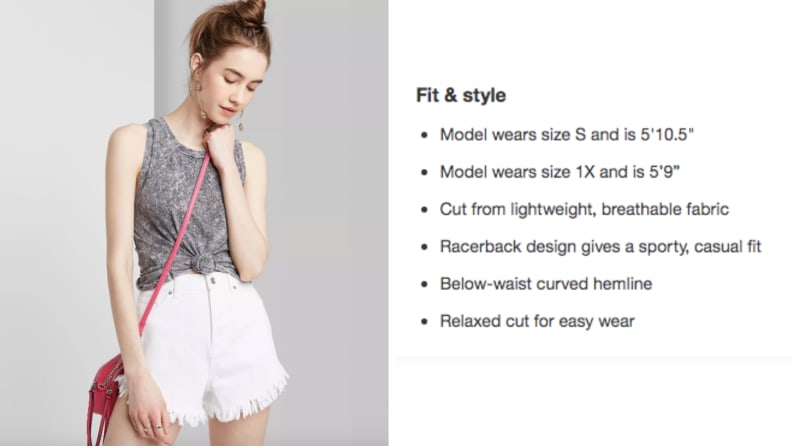
Sites like Target will give model stats to help you determine how the piece will look on you.
Most of us aren’t models—and that’s okay—but many stores feature their clothes on models who might have a completely different body type than you. Matthew Sebra, Senior Fashion Director, Men’s & Kids at Macy’s says to not let this fool you. “One of the most common mistakes is thinking that how something appears on a model is how it’s going to appear on you.”
Instead he suggests taking into account specific details that may determine if a garment will look great on your body type. “If you’re short and it looks cropped on the model, it will likely be just right for you,” he says. Some sites like Target are starting to share the stats of a model, including the size of the garment they’re wearing and their height, as well as showing multiple models wearing different sizes, which can help you figure out the fit.
3. Use a retailer’s size guide
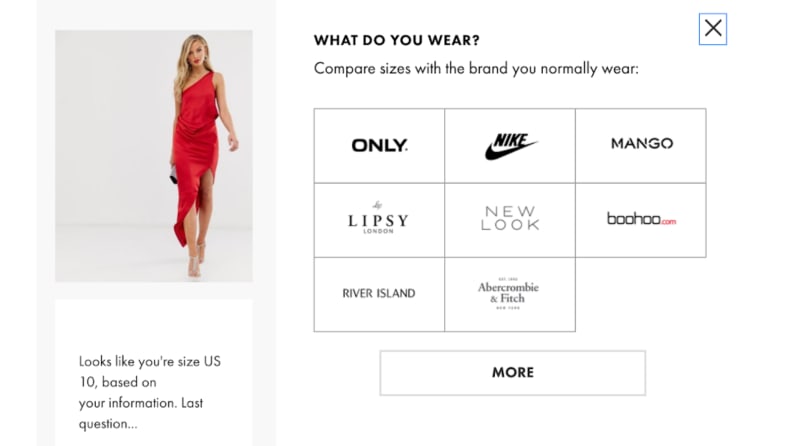
Retailers like ASOS offer size guides to help pick the right size.
Even if you know your actual measurements or have a general idea of what size you typically are, don’t overlook the size charts that many major retailers offer—some of which are incredibly helpful. Answering a few of the site’s questions regarding your shape will help determine a more accurate fit. For instance, Zara has a feature that allows you to input your height and weight to suggest a fit, along with the percentage of people with similar stats who bought and didn’t return that size. ASOS has a similar fit assistant feature and can even compare your size in other brands to help you pick the right size.
4. Actually read the reviews

Scroll through reviews and user photos to help decide your size.
Everyone loves a product that boasts thousands of reviews, but instead of just looking at the number, it’s key to actually read them—or at least a few. Skirboll says, “Pay attention to if people say the item runs big, small, or true to size.” These honest reviews are invaluable and can give you a better understanding of the fit. Also, if the site allows customers to upload photos, those can be even more helpful. Look at the pictures of customers who have similar body shapes to yours, which can serve as your visual representation of what the garment may look like on you. It's sort of like someone else trying the clothes on for you.
5. Look at positive and negative reviews first
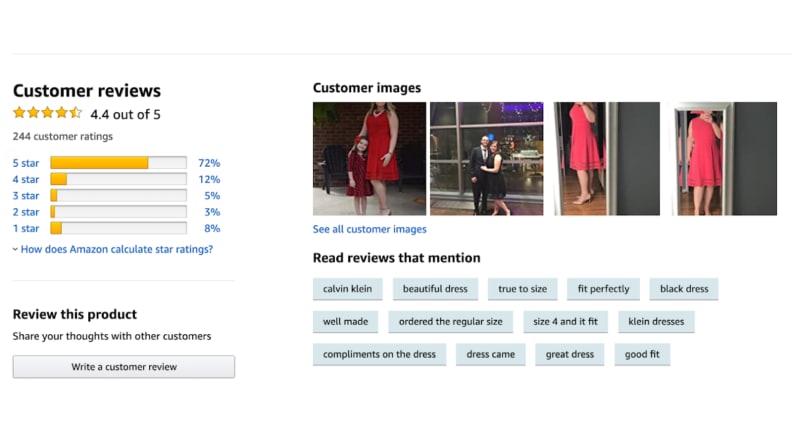
Check out reviews from 5-star and 1-star ratings first to see common praises and problems.
I use this particular tip when shopping for clothes on Amazon, but it can be used at other retailers that have frequent reviewers. With a ton of reviews, it can feel overwhelming to sift through all of them—but it’s much easier to sort reviews by the best (5-star) and the worst (1-star). Those who are absolutely praising an item or who absolutely hate it are equally passionate and are more likely to share detailed opinions. A quick scan through these reviews usually shows any common pros or cons, whether a piece runs true to size, if the material stretches out over time, or if the sizing is extremely off.
6. Consider the material used
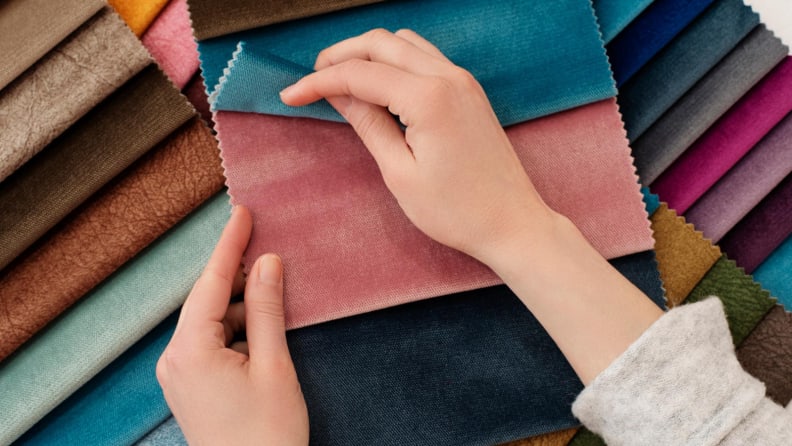
Not all fabrics fit the same.
“Keep in mind that some materials will be more forgiving than others,” Skirboll stresses. In addition to checking the actual measurements of a garment, it’s also important to note the type of material, which can affect whether you size up or down. “If you’re looking at denim with no elastane, know that they’re going to be a bit stiff and will require hours of wear and use before they start to have a little give. On the other hand, jeans made with elastane, also known as spandex or lycra, will have plenty of stretch and you can be more flexible on the sizing,” she says. Other materials to look out for are polyester, which is resistant to shrinking, and cotton, which can shrink and stretch out overtime.
7. When in doubt, size up
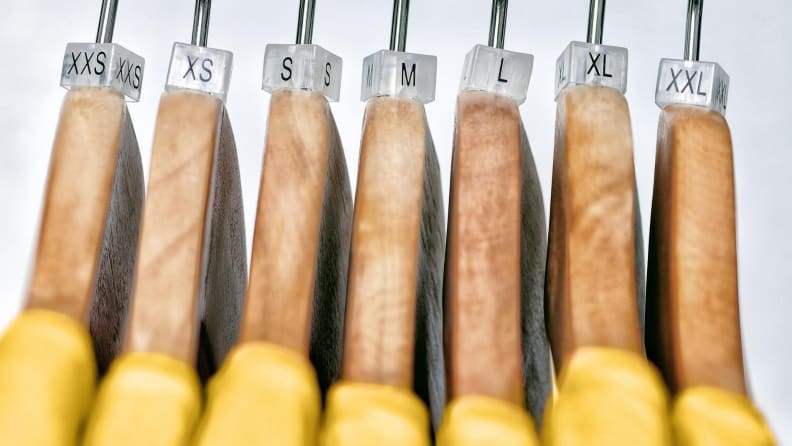
It's easier to alter a piece that's too big than one that's too small.
When you just don’t know what size to order or if you think you’re in between sizes, it’s always a safe bet to go a size up. It’s much easier to work with a garment that’s slightly bigger than one that’s too small, if you don’t want to return it. Plus, you can make any necessary alterations if you’re handy with a needle or just take the piece to a tailor. That little bit of wiggle room makes an alteration far easier and cheaper than trying to add material to a small garment.
8. Stay loyal to a select retailer
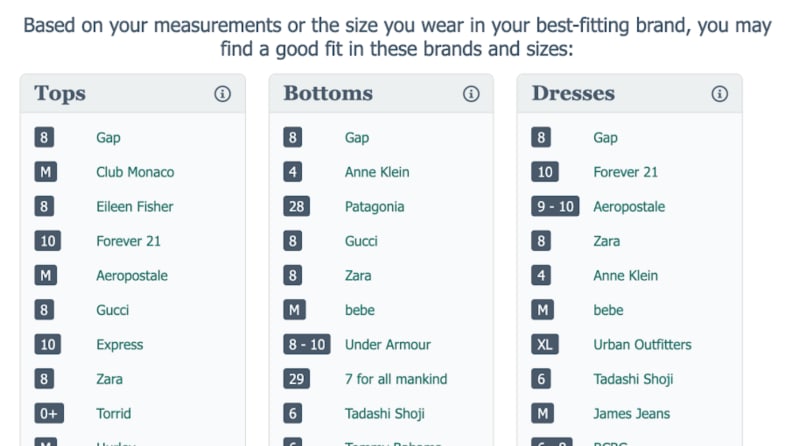
SizeCharter is a great resource for finding your size at a ton of retailers.
Unfortunately, size 10 J. Crew shorts are not the exact same size 10 at other retailers. Since there’s no universal sizing, and rather vanity sizing, one of the easiest ways to almost always get the perfect fit is to stick with the brands you know and love. “I won’t buy clothes online unless I know the brand and how it fits my body type,” Skirboll says. If you have a pair of jeans that fit you like a glove, make note of that size in your phone or as a draft in your email. This can be your quick, handy cheat sheet so you always know what size to select at that retailer.
If you already know what size works best for you in a particular brand, you can use an online tool like SizeCharter, which will give you comparable sizing at other brands. Just enter your go-to size and the results will crank out for brands like Zara, ModCloth, Free People, and even luxury retailers like Gucci or Armani.
9. Know the store’s return policy

Always double-check the store's return policy before ordering.
Even if you’ve followed all these tips for a seemingly good fit, sometimes the size is off or the fit looks way different than expected when it arrives. Double-check the retailer’s return policy, as it can make the difference between an easy transaction and being stuck with a piece you’ll likely never wear. Free returns are great because, seriously, who wants to pay for shipping both ways? But a policy that gives you some time to deliberate on your purchase and before returning is key, especially if you need time to send it back.
